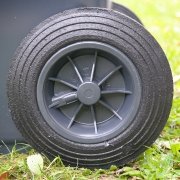Plastic bag levy should only be used to fight pollution
Since 2003, the South African government has taxed the use of plastic shopping bags in an effort to discourage consumers from using them. These levies were intended to be used for waste management and environmental initiatives, such as clean-ups and recycling programmes. However, the reality is that very little of these taxes actually go towards fighting pollution.
The government needs to ring-fence the money raised through this plastic bag levy and use it only for its intended purpose – to help clean up South Africa and tackle excess plastic waste in the environment. Plastics SA and the entire industry is working hard to minimise the volume of plastic waste that ends up in the environment. We do not like to see our products washed up on beaches and littering public spaces.
Plastics industry doing its part
“To win the war on plastic pollution, every role-player in the plastics industry needs to confront some hard truths. This includes us as the producers of plastics, but it also includes government and consumers,” says Plastics SA executive director Anton Hanekom.
“From our side, we are willing to make bold and constructive changes to our products. As members of the South African Initiative – an alliance of key members of the full packaging value chain – we are committed to transforming all our products to make them more environmentally-friendly and recyclable,” explains Hanekom.
“We will also prioritise new scalable technologies within the industry that not only make recycling and recovering plastics easier but also enable the creation of value from all plastics once they have been used. For us to be successful, we need to work closely in partnership with the government. It is, after all, the role of government to provide adequate waste management infrastructure and to correctly incentivise citizens to recycle,” he says.
The government is aware of the pollution problem
The South African government is fully aware of the excessive volumes of pollution. They have shown a willingness to confront these issues and engage with industry stakeholders. “The Department of Environmental Affairs, for example, admitted in Parliament two weeks ago that it had failed to develop competent waste management facilities, let alone recycling infrastructure,” says Hanekom.
The problem with plastic pollution arises from illegal dumping and bad waste disposal practices, combined with inadequate waste collection services. Around the country, consumers resort to dumping their waste because refuse collection services are either unreliable or non-existent.
The government can use a portion of the millions of rands raised through the plastic bag levy to boost waste management infrastructure and improve collection services. “The consequences of our weak waste management infrastructure are not only visible in our rivers and oceans, but also cost the country hundreds of millions of rands when municipalities have to clean up illegal dumping sites,” explains Hanekom.
Plastic bag levy can be put to better use
The taxes on plastic bags should be put to good use in improving infrastructure and service delivery. It could potentially be used to create thousands of jobs in the waste management industry and to safeguard the 100 000 existing jobs that the plastics industry provides.
“To start financing the upgrade of our flawed waste management system, our view is that government must immediately take steps to ring-fence the plastic bag levy that was implemented back in 2003. This levy has increased from 3c per bag in 2003 to 12c in 2018,” states Hanekom.
“The nearly R2-billion that has been raised through the levy so far, should never have been absorbed into the black hole of our national fiscus. Instead, the levy should have been ring-fenced for its intended purpose: to develop better recycling facilities and incentivise sustainable consumer behaviour,” he says.
If used and disposed of correctly, plastic can actually be a highly-valuable material for society. It has a smaller carbon footprint than so-called ‘environmentally-friendly’ alternatives, such as cotton and glass. Plastic is also cheaper to produce and can support increased economic growth through more job opportunities.
“A rational conversation about plastic pollution recognises the positive attributes of plastic and focuses on how to manage plastic waste. The time has come to have that rational conversation, and we look forward to leading the discussion,” concludes Hanekom.
___
Plastics SA represents all sectors of the South African plastics industry. Together with our associations, we play an active role in the growth and development of the industry and strive to address plastics related issues, influence role-players and make plastics the material of choice.
Plastics SA has been mandated to ensure a vibrant and sustainable plastics industry in South Africa. The plastics sector is uniquely placed to meet the needs of a sustainable society and to deliver solutions to many challenges such as recycling, climate change, water scarcity, resource usage and energy recovery.
For more news, updates and information on the South African plastics industry, follow us on Facebook, Twitter, Instagram, YouTube, LinkedIn and Pinterest.









